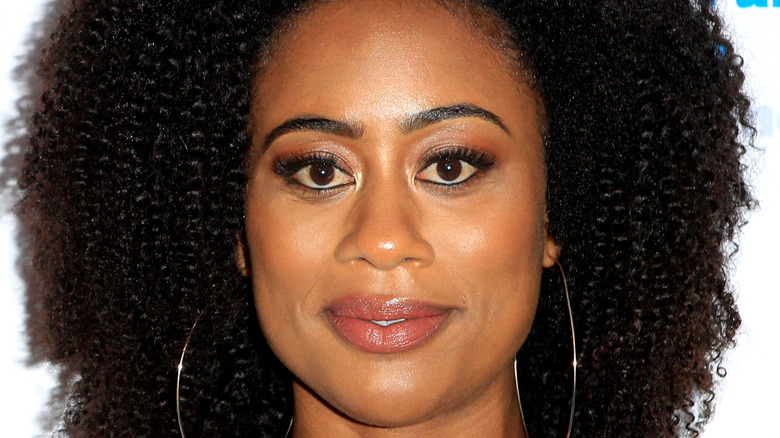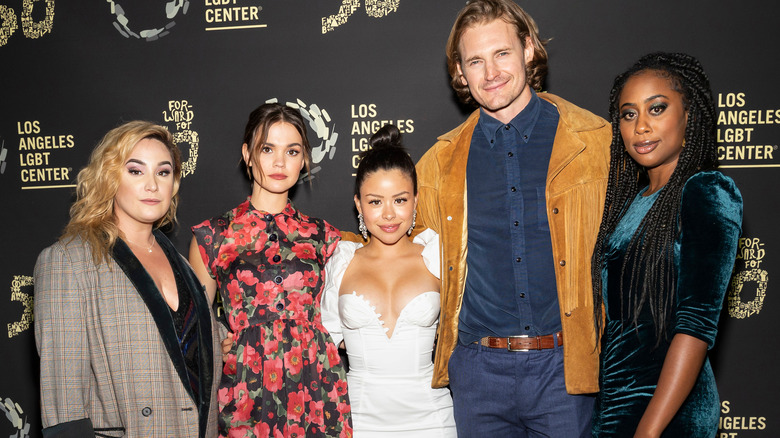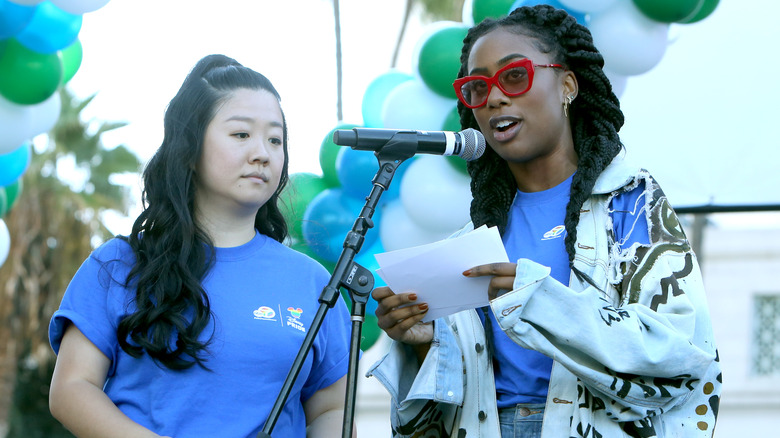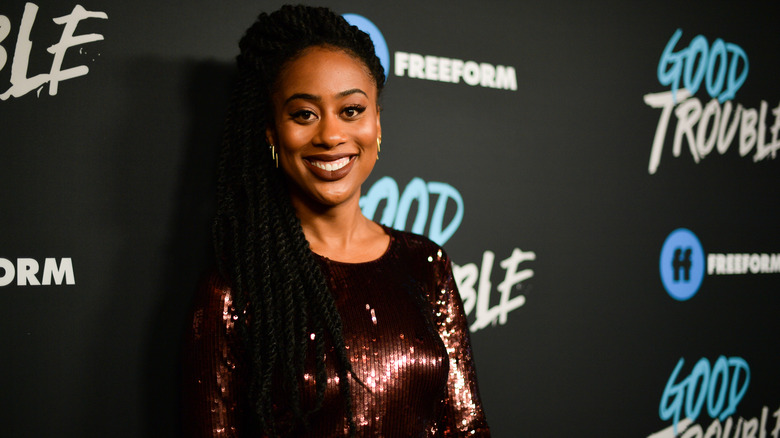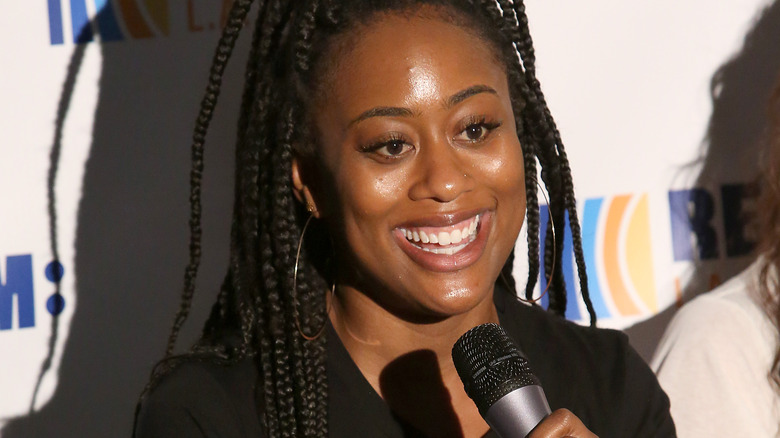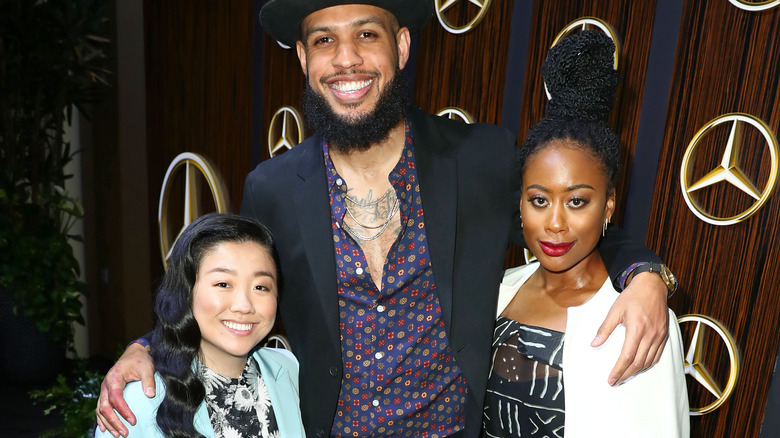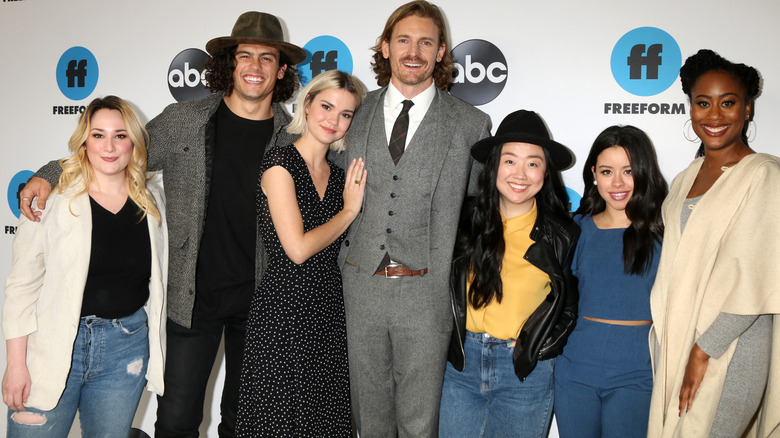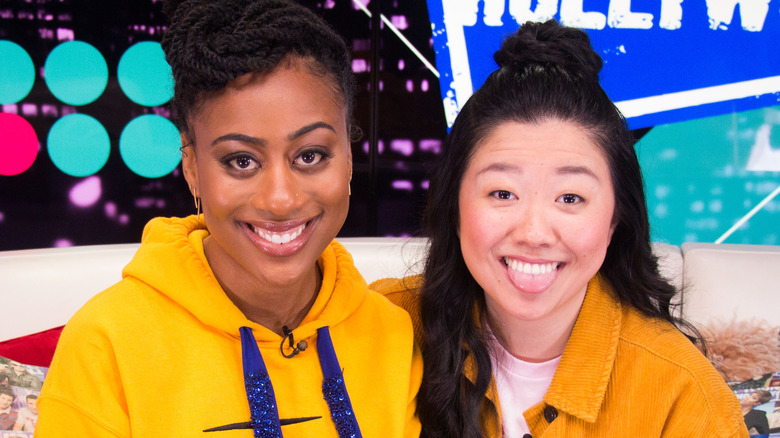Good Trouble's Zuri Adele On Everything She's Learned From The Show - Exclusive Interview
Actress Zuri Adele has been working toward her goals professionally and centering social justice causes in her daily life. On "Good Trouble," Adele plays an activist with a background in the foster care system, which she shares with the spin-off series returning characters from "The Fosters," Callie, played by Maia Mitchell, and Mariana, played by Cierra Ramirez. The spin-off series has become a powerful tool for communicating current truths about social issues — including but not limited to racism, homophobia, sexism, and mass incarceration — while also dealing with relationship and family drama like the original series.
In her exclusive interview with The List, Zuri Adele reflected on her relationship with her character Malika, who applies what she learned from her experiences with houselessness and injustice toward her work as an activist and lives in a communal environment called the Coterie with other young people similarly dedicated to activist practice. The actress shared what she's learned from expert consultants about the show's central social issues, and how she sees the series moving forward.
She also acknowledged the passing of a dear member of the Freeform family, Kimberly [Eaton], who was the voice of the show's social media, saying, "She was and will continue to be such a voice for marginalized communities."
She is paving the way for future storytellers
You've been really supportive of HBCU graduates attending MFA acting programs, specifically at UCLA. How do you see the landscape of film and television changing as the playing fields expand to include this talent?
I see it completely shifting and continuing to enhance our storytelling. I can already tell in the work that I see other HBCU grads doing ... Actually, there's another project that two of my Spelman sisters created that's coming out with Regina Hall and Sterling K. Brown.
They went to UCLA for graduate school as well, and those are a couple of examples. [There are] so many creators on "Insecure" and a lot of other projects on HBO and everywhere, we have so many people at Freeform who've gone to HBCUs, and there's something so unique about ... at an HBCU, when we learn about our craft and we learn about theater or we learn about public relations, we're learning it from the perspective of the oppressed.
We're learning history from the perspective of the African diaspora, well before when slavery started, and we're in a community where we get to experience diversity amongst Black people in a way that I didn't have in high school. There's this sense [that] it's a time to be the majority, and there's that sense of finding one's voice that is so unique that, in particular, so many Black people I know may not have the opportunity to have done, so I'm really excited about helping continue to carve those specific voices in MFA programs, so that they can take those strong perspectives and those unique stories.
With the right quality, [they are] able to shape them and tell those stories and produce them on the same level that these MFA programs like UCLA are offering, that many HBCU grads may not have access to, perhaps based on financial support, or perhaps needing to have any sort of backup plan, in some way, which always comes down to finances.
It's really important to me to support that path, because the storytelling takes over. We see it on screens now, the way that we can tell our stories in the most authentic way and an empowering way and tell more stories, narratives beyond stories about enslavement, which are very important stories to tell, but stories that are also about our everyday lives from our perspective, where we are the majority in our stories, because we are. In our own lives, we're our majority. When we're not othered, I see the impact that that's having on the world, and it feels really good, so I want to keep nurturing that in the way that I'm still learning.
The actress sees both friends and herself in her character
Have you gotten to dialogue with the writers a little bit about Malika's narrative or incorporate ideas into her storyline that align with your activist practice?
Yes, especially in the first few seasons, because pre-COVID, we were able to be on set with the writers in person and have lunch with them and develop some really authentic friendships with them. Now, we still get to have those conversations a little bit, but often those are more with the producers. I really trust them. Our showrunner, Joanna Johnson, chooses phenomenal writers rooms that are really inclusive and where she really encourages a relationship between the cast and the writers. We are in communication with each other, [but] now it's a little more virtual.
I feel really comfortable. I've had moments where I've been able to share something that's been going on with me in my life, and it's either already been written or they've seen something on social media and they've incorporated it, or it's already going on in the world and they'll incorporate it.
There was also something really beautiful about being able to work with Black Lives Matter in the first few years that helped set the tone for some really authentic storytelling, because we had Patrisse Cullors and Dr. Melina Abdullah on set with us, and I was able to shadow them a lot in their activism work, so we were able to pull those stories from their experiences, too, into Malika's life.
It's a melting pot, and to be honest, Malika is quite a mix of many of my friends and mostly my Spelman [College] sisters, but a lot of my friends, especially Black women in LA in particular, who I get to pull from in terms of their work, their approaches, speaking up for themselves, and the stories that we share when we come to each other about things that are going on at work or in life and pulling from their personalities, and even their fashion choices, all of that.
I get to have a lot of conversations with each of the designers now, even [regarding] how Malika's room is designed. I have a really great relationship with Rachel, who's our phenomenal set designer, and she's paid so much attention, based on social media, to my own décor at the home or in my apartment that she has made Malika's room feel really authentic to me.
There was something really beautiful about this show in particular where I feel merged with Malika in a healthy way. There are a lot of differences, but I can tell that they've shaped things based on what also activates me.
Her role in Good Trouble was meant to be
I read that you had called Malika a soulmate of yours.
Yes, she is. It took a little while to find her — at first, auditioning for different things and thinking one character or one job might be it, and it wasn't, or even on "The Fosters." I had auditioned for a role on "The Fosters" [that] I'm so glad I didn't get now, because I wouldn't have been able to audition for Malika for "Good Trouble." It lets me know that everything is really in divine order and Malika was my soulmate, destined to be the best.
It's something that is lasting for so long. All the things I thought may have been it, those were such great opportunities to keep learning and growing in my acting and auditioning, and those are great jobs for other people, and Malika is something that I've been able to work with her for years now. That's been so rewarding, to be with a show and an ensemble, particularly this amazing one, for an extended period of time and not only for a couple days or one episodes, but a whole series that was a spinoff of something else.
They had a family already worked into the crew, and everyone was so welcoming and the best case scenario, so it felt like a soulmate, like, "This is what we were waiting for. Got it, okay."
I'm sure that's really encouraging for other up and coming actors to hear, people who haven't found the right creative fit yet, so I hope people read this and feel that hopefulness.
I hope so too. I was just talking to [my manager] Kyle about this the other day, about some phone calls I would have with him where I wanted to throw in the towel for a minute. We'd get so close on things and not book it, or not understanding, and it can be humbling.
It was necessarily humbling, because I had been on a high horse in my MFA and my degrees and feeling like the star of the show in school, and it was necessary to be in the working world and to understand that there was a whole lot more to learn about acting for the camera and auditioning and navigating LA and getting all these different lots, and all of that, before COVID. When it's the right fit, it is the right fit. The journey there, though, is the classroom that helped me be ready for the job.
On the job, I'm still learning. I feel like I'm just now finding my rhythm, and we are about to start Season 5. It's a nice, long game, and I hope anyone reading this remembers to give themselves grace and to be in the classroom.
She's gotten to learn from experts on the issues she cares about
Speaking of being in the classroom on set, have you learned anything from the show's consultants or the characters that's changed your perception of the issues they're involved with, like the BLM movement or mass incarceration or the experience of houseless folks in LA?
Yes, all of it. Every single one. Most recently, the unhoused crisis in Los Angeles in particular. I've gotten to learn so much more about the crisis at hand, and it's given me a lot more perspective around Los Angeles.
I've started to learn a lot more about the statistics, the politics behind it, and in a way, that's helping me learn what can be done and what support is needed and what support is actual support. It's definitely highlighted that for me, especially now in the pandemic. It feels easy to block out any external experiences because we can come to our homes and our bubbles and we can tap into the internet when we feel like learning about what's going on in the world, so the show has been a really helpful tool for me to understand what people are really moving through and what Malika encountered when she was unhoused.
With BLM in particular, I learned a lot about activism, beyond protesting, about what it requires to and what really comes with being an abolitionist, and what is required when it comes to supporting families beyond fundraising for families, to be there with families who are grieving murder after the press is gone, and the type of self care required to be an activist and abolitionist on the front lines, and the community needed, the community support that is needed to be an activist.
I've learned a lot from working with, in particular, Patrisse Cullors and Dr. Melina Abdullah. Both of them have given me a lot of hands-on insight to what it is to show up every day in the ways that they do, beyond the hashtag of BLM, beyond the protesting, which is so necessary. Beyond that, it is a nonstop, full-time job on top of their full-time jobs.
I've learned so much, and I'm learning and I'm continuing to learn more about the polyamorous experience. I'm learning a lot more about that through Malika's experience and also through my own research inspired by Malika's experience. We have so many different cultural backgrounds, so I've gotten to learn a lot there ... through the trans experience, I'm really grateful for the trans visibility that we are contributing to with our show and excited for more of that. The list goes on. It's a classroom. This show is such a great classroom.
Zuri Adele is into her character's polyamorous storyline
About the polyamorous storyline, how did you feel about that when it first started coming up?
Okay, so I was really excited when this came up. Our showrunner, Joanna Johnson, reached out with me to check in with me about writing that into Malika's storyline, and I was really excited about that. As a millennial queer person, polyamory is something that is very interesting to me and that I haven't learned a lot about how to practice [it] myself, and the idea of consensual non-monogamy is something that is interesting to me, so I'm really excited that we're putting that on TV and breaking down all the binaries.
I was really excited for Malika to tap into that. Most of the times where I've seen something that highlights polyamory in the past, it has been more so about a sexual experience of a threesome, for a man to fetishize being with two women, or something that's particularly more of a white experience, so it's been really cool to be a part of this millennial, Black experience where it's normalized that, "Oh yeah, this guy Dyonte has a primary partner." We're using this vocabulary.
Somebody told me the other day, "Your show's like millennial Sesame Street." At first I was like, "I don't know if I like that," but it is, and I'm okay with that. We're learning new words and we're getting on the surface of a lot of things, because we have a lot of storylines, so I was excited to add that in through Malika's storyline in particular, rather than any other character.
She is someone who is a former foster kid, who was formerly unhoused, so the idea of chosen family is really important, it really resonates her with a different way than the other Coterie members, and so I can understand ... I'm an only child, so that's how I relate there, but having her own safe place and then having multiple lovers outside feels really safe and exciting for her at the same time.
She's got her own home and landing pad, and then she can tap in and not fully be tied down to anyone, but also doing it in a really conscious and respectful and honest way. I was excited for that. I was excited for Malika to date women as well and to explore her queerness.
The actress has hopes for Malika's romantic future
Do you root for anyone the most in Malika's varied love interests, or do you kind of keep your own interests aside?
I'm always rooting for Isaac. Our chemistry ... I love my chemistry with all of my castmates, so I can't say that I'm rooting for one actor over the other, but storyline-wise, I really like the ways in which Isaac and Malika challenge each other and still hold each other down. Their love was different. Their love was beyond the surface.
They didn't start off in a perfect way. He overlooked her, they weren't necessarily first attracted to each other, but there was something about their personalities that drew each other in and is what had them hold each other down. That's something that felt and feels healthy for Malika, although it was at a point where she needed to tap into some other things. I was very excited for her to do that and choose herself.
We'll see if Isaac gets his s*** together and if Malika gets hers together. They're growing, they're on their journeys right now. I really root for them. For each of them, they're the one that they probably each think about and have those inside jokes with that they can't quite get with the others.
I love that for her. I love all my castmates. Malika gets to choose herself. They're so great. I got to meet so many great people.
If you had to be in a real life Coterie situation with people from the cast, how do you think it would go?
It would be tumultuous, it would be fun, it would be necessary. When I think about that, I think about our real cast and how our text groups are and how we are. Sometimes, we have our own little Coterie gatherings at somebody's house on weekends, and it would be great. Just like our characters do, because the show is cast so well, we each do bring something really different to the table, so it would be really well balanced. We would get on each other's nerves sometimes, [but] we would come together and make each other better and stronger, just like we really do, and it would be challenging in ways that are healthy and good.
Each person is so passionate about doing the right thing, and we do sometimes disagree about ... "This is the character," and sometimes we [also] disagree about ... the people. Sometimes, we disagree about how to go, or we're learning so much. We have different perspectives and life experiences where we have different methods of how to go about the right thing, so we get to learn a lot from each other. If we lived, and we should actually try that as a cast, live together for a week and see what would happen, it would be very fun, because we've done it for a couple days.
The actress has some major predictions for audience reactions to the Season 4 finale
If you had to have a roommate, who do you think would be the best fit for you?
Ooh, honey. Sherry [Cole], it would have to be Sherry, even though we would drive each other crazy. It would be in the best way. Yeah, it would have to be Sherry, but I could do it with anybody.
Do you have any hopes for Malika or other characters' storylines, or are there any issues you guys haven't addressed as much that you'd like to focus in on in the next season?
Oh, I love that question. I want Malika to keep choosing herself, and I hope and expect that she will continue to grow as a leader and find her mode of being an abolitionist, whatever that is, if that's in a political space, if that's outside of it, I truly don't know, but I love that she's giving herself permission to explore.
I see her as a leader. She likes to execute her ideas and she gets such unique ideas on how to support people, she's really passionate about it, and she doesn't always like to follow other people's rules, so I see her doing and running her own thing, which really excites me. I'm glad you asked me that. I want Malika to be more and more confident, be more and more of the bad b***h I know she wants to be, for her and myself as well.
[I want her] to keep tapping into that and maybe choose her and do her for a little bit. Fast from the romance for a little while, although I know it's entertaining. If she was my sis, my girl, I might say, "You know, maybe it's time for you to do you for a little minute." I know it's TV, it's entertainment, so we'll see about that.
It's been so great to see Malika's growth and her coming into her own and choosing herself. Is there anything you want fans to know going into the Season 4 finale?
I want fans to make sure they are sitting down and have their water and tea near them, don't take your eyes away from the screen, and take deep breaths. Don't ask me questions when it's over, because I really don't know. I'm remembering the table read, and we were at the edge of our seats, so I want everybody to do a little yoga before you watch the episode and breathe and have fun. It's going to be a wild ride, and then you're going to have to wait.
The Season 4 finale of Freeform's "Good Trouble" premieres on September 1st.
This interview has been edited for clarity.
